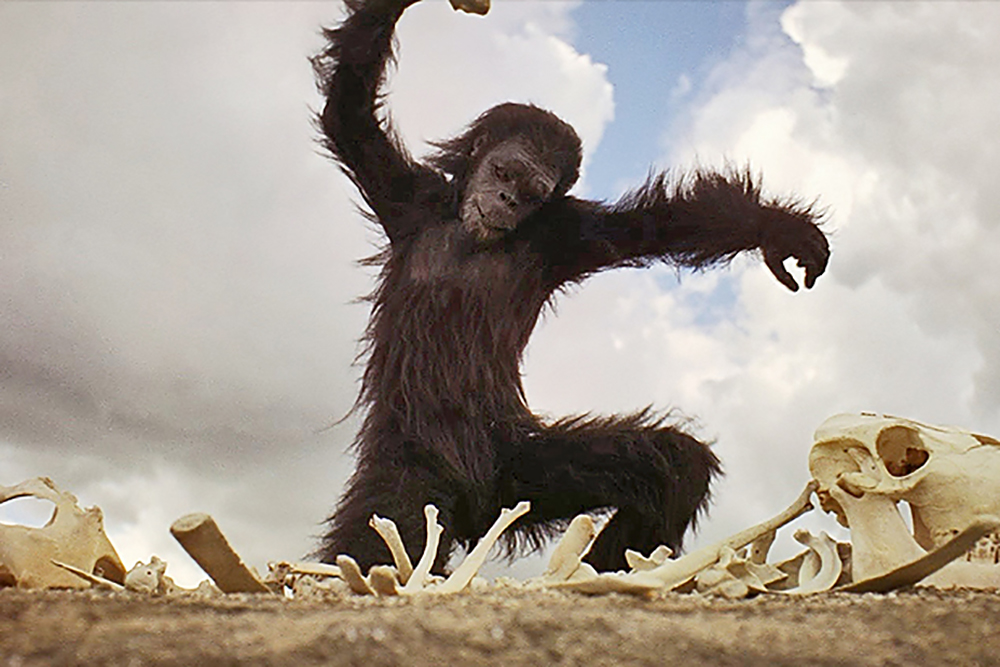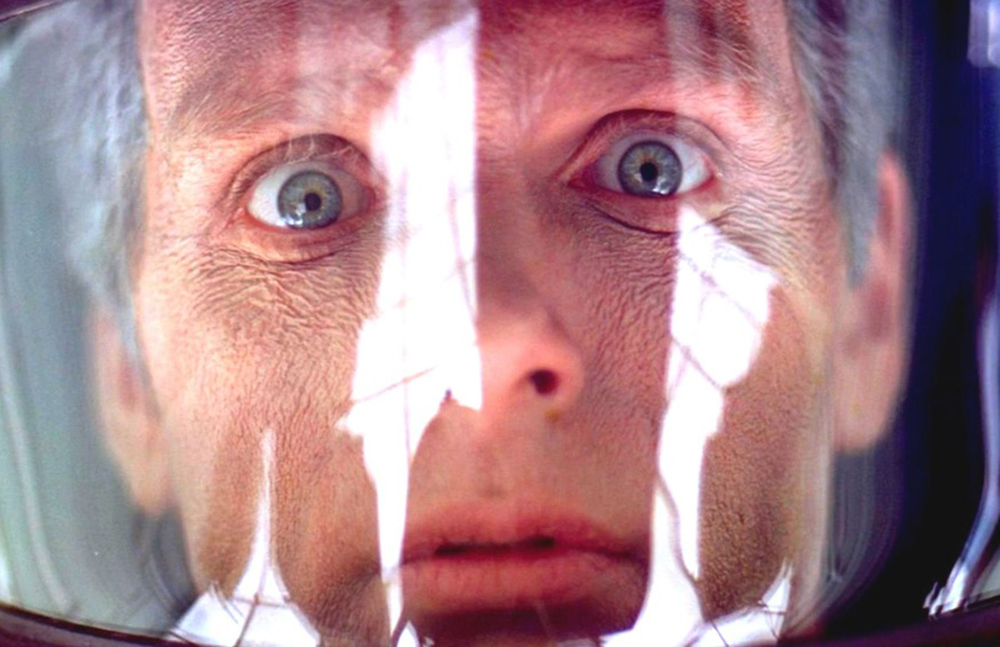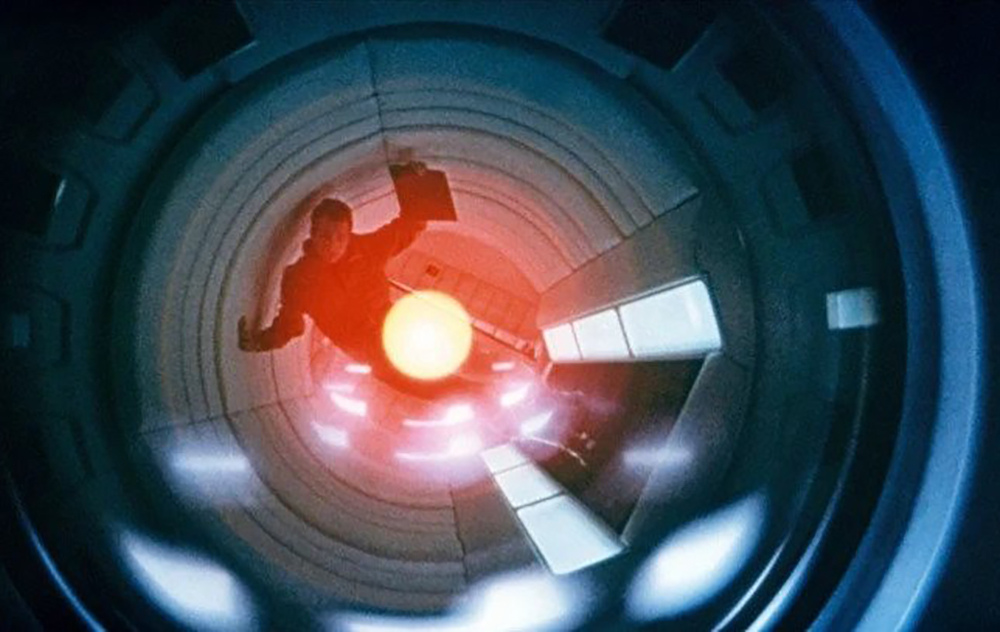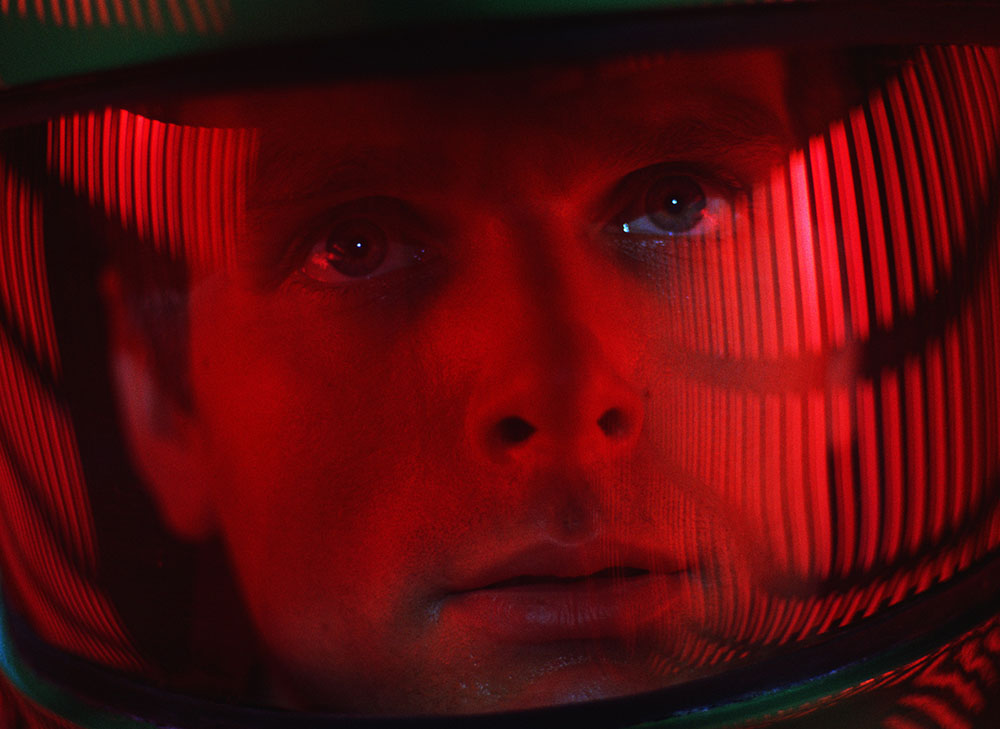Apart from all these extravagances, from the core “2001” is a complex philosophical movie. The philosophy of 19th Century German philosopher Friedrich Nietzsche is profoundly seen throughout the movie. One of his most famous aphorisms of evolution of humanity from its primitiveness to the higher self can be seen in “2001” from its alpha to omega. From the very first frame, Kubrick establishes this notion. With stunning imagery of a solar eclipse accompanied by Richard Strauss’ enigmatic musical piece “Also Sprach Zarathustra” (also inspired from Nietzsche’s writing), Kubrick directly references Nietzsche in his modern-day human odyssey.
Humanity Has to be Surpassed – Establishing the Notion

The first shot resembles the opening of Nietzsche’s “Thus Spoke Zarathustra,” where it opens with Zarathustra’s worship of the sun for its overflowing radiation of wisdom over humanity. Resembling Zarathustra, Kubrick uses this metaphor as his offering of admiration for the great star by establishing it as a symbol of the source of the Universe. A source from which everything was created in this cosmos in the form of the primary matter of stardust.
He then jumps to the “Dawn of Man” sequence, linking the pathway of evolution from the primitive stardust to the primates. Eventually, this evolution leads us to the human of the 21st Century with the famous match cut from a bone to a space shuttle. With the rapid shift from the primates to the modern man, Kubrick conjugates Nietzsche’s idea about the evolution from primitivism to a higher self.
But becoming human is not the endpoint of this evolution. “Humanity has to be surpassed,” thus spoke Nietzsche. Thus become a modern human with achieving and establishing its superiority is not the extreme end of this evolution. It’s yet to become the superman, the surpassing being of humanity. In one of his wonderful quotes, he stated, “Man is a rope stretched between the animal and the superman—a rope over an abyss.”
Dive into the Dangerous Abyss in the Form of Space Exploration – Journey towards the Superman

Kubrick profoundly illustrates the constant urge to overcome humanity in the context of space exploration. From the point of the jump cut, he throws us to the world of unknown in space. The space here signifies the abyss over which humans float with their spaceships. It is a dangerous abyss, where the rules of the world do not apply. Humans have to re-learn normal things there such as eating, sleeping, communicating with others, and even how to use the bathroom (zero-gravity toilet). In these things, we can interpret them as a metaphor for the progression towards advancement to become superman.
David Bowman as the Starchild

But not everyone can be superman. In the movie, only David Bowman reaches Jupiter and through the stargate, he enters the enlightened cave of eternal recurrence. In the end sequence, it reveals that he ages rapidly and eventually dies and become a child again.
This child is the last stage of overcoming humanity. He is the creator and can elevate himself as the overman. And as the overman is not someone unearthly, Kubrick takes him back to Earth, where he gazes towards the blue planet in the epic finale.
But why does just only David Bowman becomes the Starchild? Kubrick tries to answer this question again by following Nietzsche. One of Nietzsche’s famous philosophical concepts is ‘Will to Power.’ Kubrick uses this notion in the form of the mysterious monolith. The monolith appears four times in the movie, each in a different course of the story. And each time, it provides (at least seems to provide) some sort of intelligence to further the evolution.
The Mysterious Monolith and Will to Power
First, in the “Dawn of Men” sequence, the apes gain the knowledge to use bones as a weapon for their prey and self-defense. Second, in the moon, it indicates the scientists explore Jupiter. Third, we see the monolith orbits the Jupiter axis, leading Bowman’s pod to the stargate. And finally, it appears at the time of Bowman’s death as it converts him to the Starchild. If we watch closely, the film shows the monolith here as the intelligence to grow. Some may argue that the monolith may be a kind of communicating medium placed by extra-terrestrials. But, with Kubrick’s admiration towards Nietzsche (who doesn’t believe in anything unearthly) throughout the movie, we can conclude that the monolith is a symbol of humans will for wisdom, truth, and power.
Apart from all these extravagances, from the core ‘2001’ is a complex philosophical movie.”
David Bowman has that will until the end. Kubrick designs this character with no emotional contact. Except for him, all the other important characters show some sort of emotionality. Dr Floyd shows his affection towards his daughter, Frank Poole seems quite sad when his parents wish him happy birthday via telephonic face time, and all other scientists are worried about the mysterious monolith. These all insights establish their psyche as well as backstories in a way.
But for Bowman, he is just is what we see him in the picture. He doesn’t allow us to delve into his character’s psyche and does not contain any backstory. His deadpan face does not show much emotion. Maybe Kubrick wants him to become the character that lives in his solitude. Away from the other last men, who are too emotional to become wary of the “Will to Truth” (thus also the “Will to Power”), it’s only Bowman who can reach the mysterious room for enlightenment.
HAL- A Weary Machine, Afraid of Overcoming

Among all, another thing that has to take into consideration, the role of HAL. Except for bowman, it is the only thing that can break free of all the obstacles and become superman. But despite having all the mechanical abilities, it shows emotions too. In that process, it’s also wary about the will to truth. In that wariness, it kills all the crew members. Also to overcome humanity, human has to follow the path of the abyss alone. In the end, the lobotomy of HAL breaks his dominance over humanity and its own wariness. With the song “Daisy Daisy” it retrogrades into his primitiveness and the final obstacle for humanity to surpass is overcome.
Conclusion
“2001: A Space Odyssey” is cinema’s clear masterpiece. Created by one of the cinema’s giants, Kubrick’s contemplation of Nietzschean philosophy is something that only can be felt, and can’t be described. And, after 53 years, this film and the philosophy it harbours undoubtedly way ahead of our imagination.
Support the Site: Consider becoming a sponsor to unlock exclusive, member-only content and help support The Movie Buff!

